Proposal Rejection Letter
Subject: Proposal Rejection
Dear [Recipient's Name],
I hope this letter finds you well. I am writing to inform you that, after careful consideration, we have made the difficult decision to reject your proposal submitted on [date]. We appreciate the time and effort you invested in preparing and presenting the proposal to us. We received several submissions, and while yours displayed merit and potential, we have ultimately chosen a different proposal that aligns more closely with our requirements and objectives.
We understand the effort and passion you put into your proposal, and we recognize the value of your ideas. However, due to various factors such as budget constraints, project prioritization, and other specific considerations, we regret to inform you that we cannot proceed with your proposal at this time.
Please note that this decision does not reflect on the quality of your work or your abilities. We received many excellent proposals, making the evaluation process challenging. Our decision was based solely on our specific needs and priorities, which may change over time.
We appreciate your understanding in this matter. We encourage you to continue pursuing your innovative ideas and initiatives, as they undoubtedly hold great potential. While we cannot collaborate on this particular project, we remain open to future opportunities for collaboration or partnerships.
Thank you once again for your interest in our organization and for the time and effort you invested in preparing the proposal. We wish you every success in your future endeavors.
Should you have any questions or require further clarification, please do not hesitate to reach out to us. We are more than willing to provide feedback that may assist you in future proposals.
Thank you for your understanding.
Sincerely,
[Your Name]
[Your Title]
[Your Organization]
Formal Proposal Rejection Letter
Subject: Proposal Rejection Notice
Dear [Recipient's Name],
We appreciate the effort and time you have invested in submitting your proposal titled "[Proposal Title]." After careful consideration, we regret to inform you that your proposal has not been selected for further consideration at this time.
We encourage you to submit future proposals and wish you success in your upcoming endeavors.
Sincerely,
[Your Name]
[Your Position]
[Company/Organization Name]
Casual Proposal Rejection Email
Subject: Your Proposal Submission
Hi [Recipient's Name],
Thank you for sending over your proposal "[Proposal Title]." Unfortunately, we won’t be moving forward with it at this moment. We really appreciate your effort and hope to see more submissions from you in the future.
Best regards,
[Your Name]
Heartfelt Proposal Rejection Letter
Subject: Response to Your Proposal
Dear [Recipient's Name],
We sincerely appreciate the creativity and dedication reflected in your proposal "[Proposal Title]." It was a difficult decision, but we regret to inform you that it cannot be accepted at this time. Your ideas are valuable, and we encourage you to continue innovating and sharing them with us in the future.
With best regards,
[Your Name]
[Your Position]
Quick and Direct Proposal Rejection Message
Subject: Proposal Outcome
Dear [Recipient's Name],
Thank you for your proposal "[Proposal Title]." After review, we will not be moving forward with it. We appreciate your time and effort.
Regards,
[Your Name]
Provisional / Conditional Rejection Letter
Subject: Proposal Review Outcome
Dear [Recipient's Name],
We have reviewed your proposal "[Proposal Title]" and, unfortunately, cannot approve it at this time. However, we recognize the potential of your ideas and encourage you to refine certain aspects and resubmit in the future. Specific feedback can be provided upon request.
Thank you for your effort and interest.
Sincerely,
[Your Name]
[Your Position]
Funny Proposal Rejection Email
Subject: Proposal Verdict
Hey [Recipient's Name],
Your proposal "[Proposal Title]" gave us quite a chuckle and lots of discussion! Sadly, we can’t move forward with it right now. Keep the creativity flowing—we can’t wait to see what you come up with next.
Cheers,
[Your Name]
What / Why: Understanding a Proposal Rejection Letter
A proposal rejection letter is a written communication sent to inform an individual or organization that their submitted proposal has not been accepted. Its purpose is to:
- Communicate the decision clearly and professionally.
- Maintain a positive relationship despite rejection.
- Provide closure and potentially offer feedback or encouragement for future submissions.
- Serve as a formal record of the decision.
Who Should Send a Proposal Rejection Letter
- Decision-makers or managers responsible for evaluating proposals.
- Organizational representatives with authority to approve or deny proposals.
- Project leads, procurement officers, or department heads, depending on the context.
- In some cases, automated systems or administrative assistants may send the message on behalf of decision-makers.
Whom a Proposal Rejection Letter Should Be Addressed To
- The individual or team who submitted the proposal.
- Secondary stakeholders if necessary, such as project sponsors or partners.
- Ensure the letter is directed to the primary contact provided in the proposal submission.
When to Send a Proposal Rejection Letter
- After the evaluation period of submitted proposals is completed.
- When the decision has been finalized but before the submitter inquires.
- For proposals that are incomplete, do not meet requirements, or fail to align with organizational goals.
- Immediately after decision-making to maintain professional communication standards.
How to Write and Send a Proposal Rejection Letter
- Begin with a polite and clear subject line or greeting.
- Acknowledge receipt and review of the proposal.
- State the decision clearly without ambiguity.
- Optionally provide constructive feedback or encouragement for future submissions.
- Maintain a professional, courteous tone.
- Send via email or printed letter depending on organizational norms.
Tricks and Tips for Writing a Proposal Rejection Letter
- Personalize the letter to avoid generic phrasing.
- Keep the tone professional yet empathetic.
- Avoid overly harsh language; focus on the decision, not the individual.
- Offer feedback or invite resubmission if possible.
- Ensure spelling and grammar are correct to maintain credibility.
Formatting Guidelines for Proposal Rejection Letters
- Length: Typically 2–4 paragraphs.
- Tone: Professional, formal, or occasionally casual depending on context.
- Wording: Clear, concise, and respectful.
- Mode: Email for digital submissions; printed letter for formal or official proposals.
- Closing: Thank the recipient for their effort and encourage future engagement.
Requirements and Prerequisites Before Sending
- Complete evaluation of all submitted proposals.
- Agreement among decision-makers on the rejection.
- Prepare optional feedback or reasons for rejection.
- Verify recipient information to ensure proper delivery.
- Ensure the letter aligns with organizational communication policies.
After Sending / Follow-up Actions
- Confirm receipt if sending digitally.
- Be prepared to respond to inquiries or requests for feedback.
- Maintain a record of sent letters for organizational documentation.
- Monitor for resubmissions or continued engagement from the submitter.
Common Mistakes to Avoid in Proposal Rejection Letters
- Using ambiguous language that leaves room for misunderstanding.
- Being overly negative or discouraging.
- Forgetting to acknowledge effort or the value of the submission.
- Sending the letter late, which may frustrate recipients.
- Neglecting to check for correct names, proposal titles, and dates.
Elements and Structure of a Proposal Rejection Letter
- Subject Line/Title: Clear indication of rejection.
- Greeting: Address recipient by name.
- Acknowledgment: Mention receipt and review of the proposal.
- Decision Statement: Clearly state rejection.
- Optional Feedback: Provide constructive notes if appropriate.
- Closing: Thank the recipient and offer future encouragement.
- Signature: Name, position, and organization.
Compare and Contrast: Proposal Rejection Letter vs Other Communication
- Compared to approval letters, rejection letters focus on decline rather than acceptance.
- Unlike informal feedback, it serves as an official record.
- Alternative methods include phone calls or in-person meetings, which may be suitable for smaller organizations or sensitive cases.
- Provides a written trail for accountability and documentation.
Pros and Cons of Sending Proposal Rejection Letters
Pros:
- Maintains professionalism and clear communication.
- Encourages future engagement with constructive feedback.
- Provides legal or organizational documentation of the decision.
Cons:
- May disappoint or discourage recipients.
- Requires careful wording to avoid misunderstandings.
- Could generate follow-up questions or complaints if not clear.
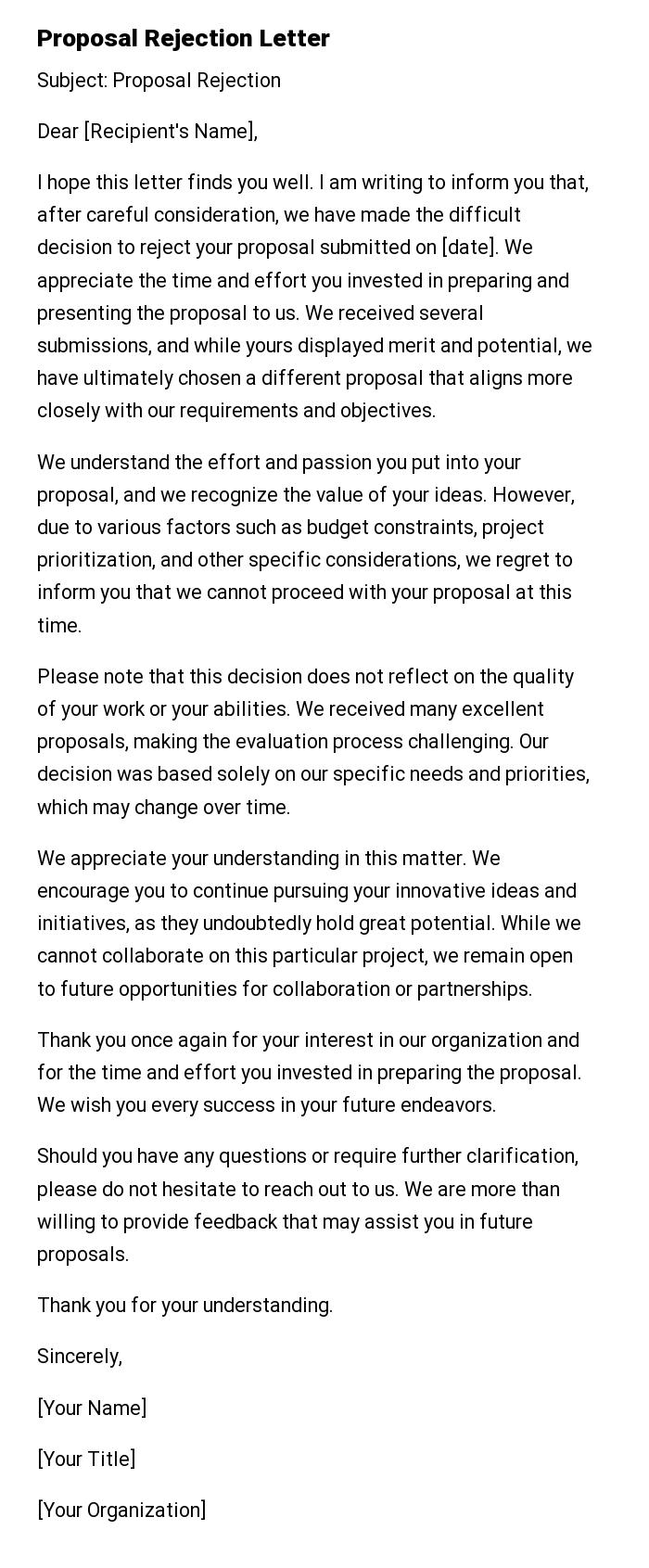
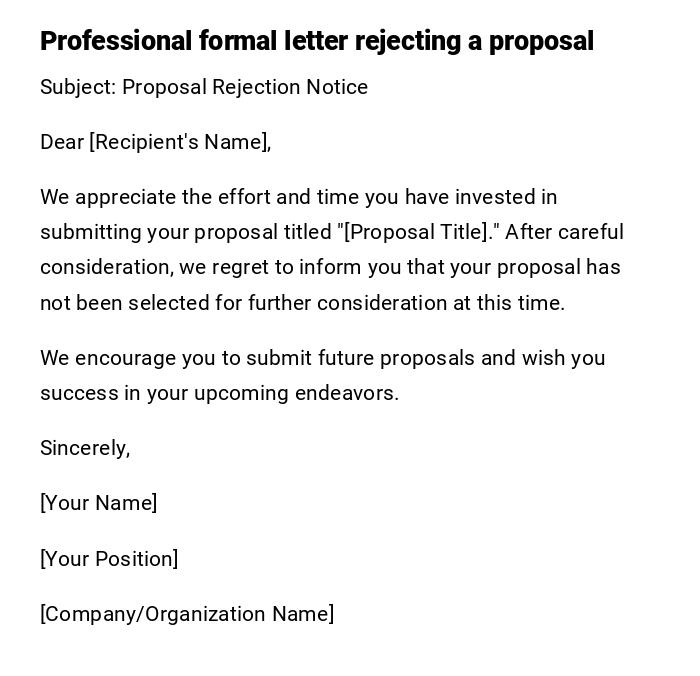
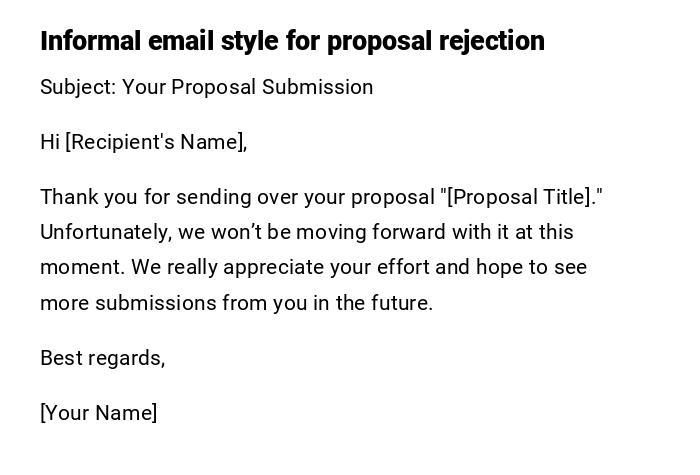
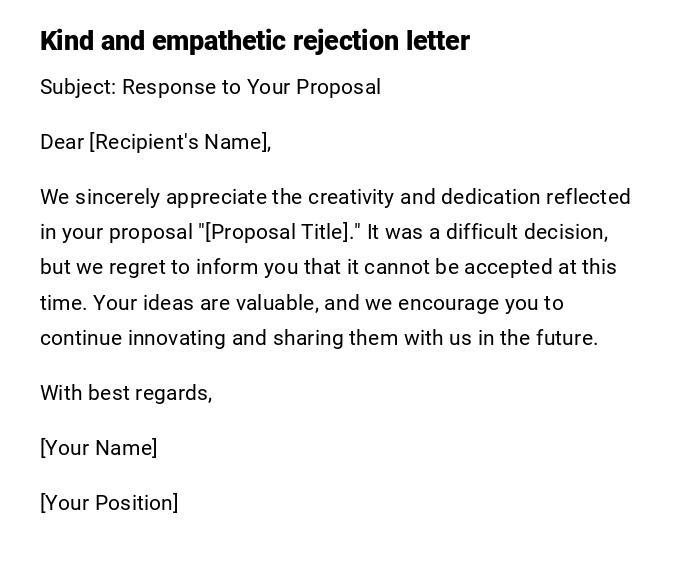
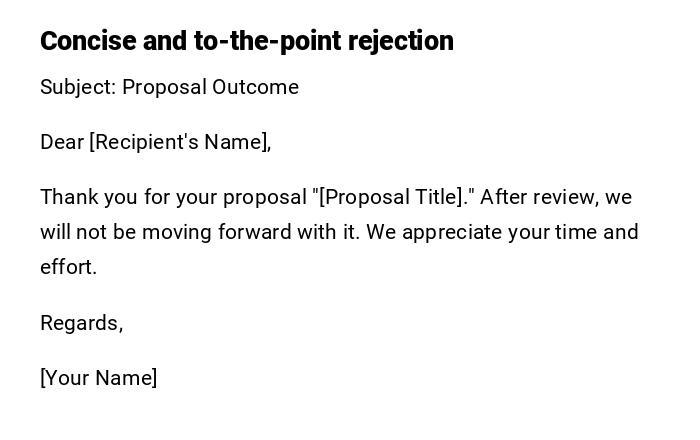
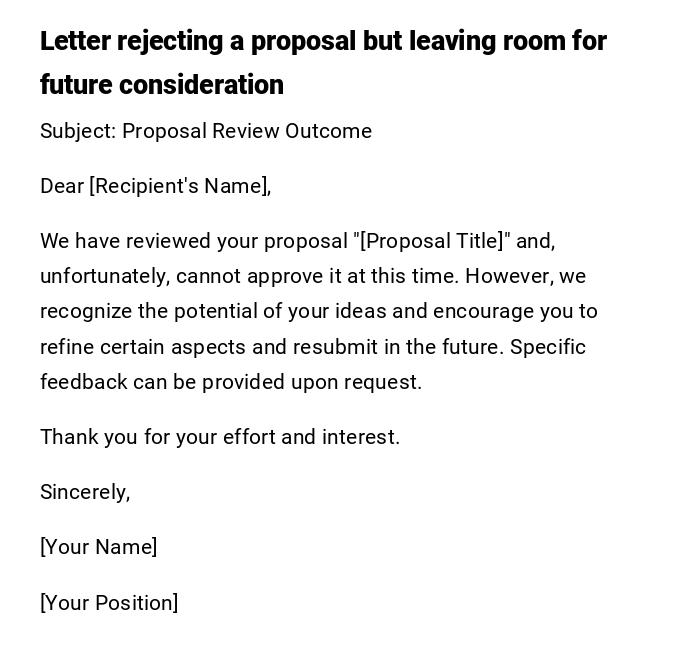
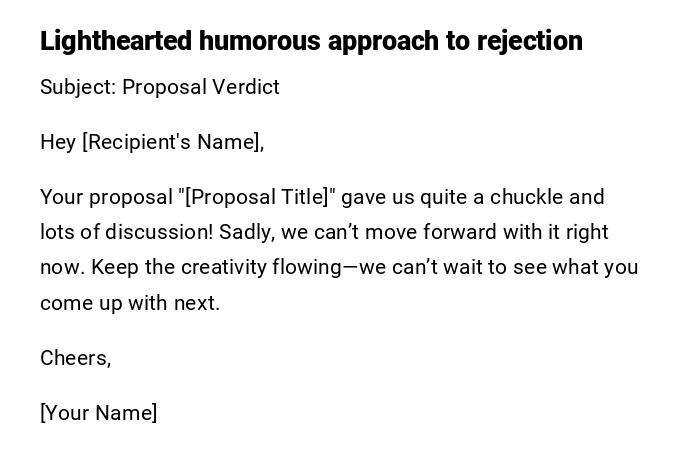

 Download Word Doc
Download Word Doc
 Download PDF
Download PDF